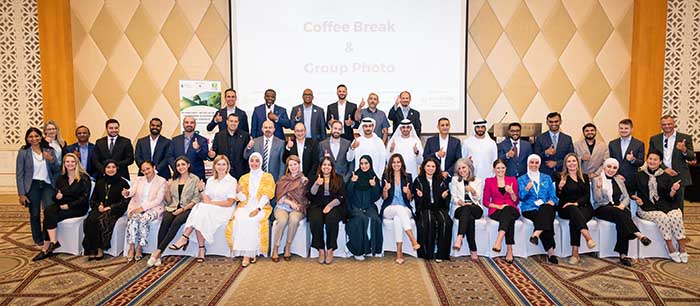13th EmiratesGBC Annual Congress makes a unified call to action to decarbonize the building sector by 2030
Building on the momentum created by the breakthrough outcomes of COP28 hosted in the UAE last year, the Emirates Green Building Council (EmiratesGBC) convened policymakers, regulators, industry leaders, and academia at its 13th Annual Congress to explore the critical role of the built environment in facilitating the global transition to sustainability and accelerating climate action.
Held under the title, ‘Beyond COP28: The Role of the Built Environment to Deliver on the UAE Consensus’, at Grand Hyatt, Dubai, the EmiratesGBC Congress united stakeholders to foster dialogue and discussions on ways to deliver on the key energy and climate commitments of the 28th Conference of Parties (COP) through concrete actions aimed at keeping the 1.5 °C goal within reach.
EmiratesGBC, a non-profit organization aimed at advancing sustainability in the built environment by strengthening and promoting green building practices, also hosted prominent regional and international experts to discuss and examine common challenges, identify opportunities, and share best practices to drive transformation across diverse industry sectors and implement concrete actions to fulfill the ambitious commitments outlined in The UAE Consensus.
Khaled Bushnaq, Chairman of EmiratesGBC, welcomed guests, and Elham AlQasim, Chief Strategy and Technology Officer, Majid Al Futtaim Holding, delivered the opening remarks on behalf of H.H. Sheikha Shamma bint Sultan bin Khalifa bin Zayed Al Nahyan, Honorary President of EmiratesGBC, and President and CEO, UAE Independent Climate Change Accelerators (UICCA), on the opening day.
The 2024 edition of the Congress organized in-depth presentations and panel discussions under five thematic sessions: Actioning COP28 Outcomes; Policies Driving Sustainability in the Built Environment; Green Supply Chain; Accelerating Progress to Net Zero; and Financing the Transition in the Built Environment.
In her opening remarks, Elham AlQasim urged stakeholders in the sector to work together and lead the way with ambitious projects and innovative solutions that can help achieve net zero targets, especially since 81.4% of the total emissions reduction targeted by 2030 is expected to come from the building sector. Emphasizing the nation’s commitment to environmental sustainability and climate change mitigation, she underscored the built environment’s crucial role in driving a real-world response to the Global Stocktake.
Although buildings and construction are collectively responsible for almost 40% of global carbon emissions, the sector also has an opportunity to close the gap to 1.5°C through an energy-efficient, regenerative, and just transition, she said. Highlighting the accomplishments of the UAE in driving ecologically friendly building practices and sustainable urban development, she emphasized the need for continued focus on renewables, demand-side management, water and energy use efficiency, and reduced resource consumption and waste to drive forward the country’s net zero ambitions.
“The building and construction sector consumes nearly half of the world’s raw materials while contributing almost 40% of global energy-related CO2 emissions and solid waste. However, it also has an opportunity to close the gap to 1.5°C through an energy-efficient, regenerative, and just transition,” she said. Highlighting the UAE’s accomplishments in driving ecologically friendly building practices and sustainable urban development, she emphasized the need for continued focus on renewables, energy efficiency, and reducing resource consumption to advance the country’s sustainability goals.
Khaled Bushnaq, Chairman of EmiratesGBC, reiterated the need for leveraging cutting-edge technologies, innovative design strategies, and updated building codes to propel the green building agenda in the UAE. He said: “Since COP28, the appetite for change within our industry is growing, and we are beginning to see this translate into action. Our choices in designing, constructing, and managing our built environment will ensure that our buildings and infrastructure are zero-carbon, resilient, and sustainable and determine the legacy we leave for future generations.”
The EmiratesGBC Chairman called for exploring the untapped potential of retrofitting and green finance mechanisms to reduce existing vulnerabilities in Arab cities and to maintain and improve local resilience. He said: “The UAE Consensus has provided us with a robust framework, and it is now up to us to carry this legacy forward with unwavering commitment. Informed decision-making, supported by robust data, will be crucial for our progress.”
“Achieving net zero is no longer a distant goal; the future of the built environment is in our hands,” he concluded.
Participants and speakers highlighted how the UAE’s ‘pro-climate, pro-growth’ strategy is helping reduce the country’s environmental footprint and setting higher climate action goals. Under the Third Update of the Second Nationally Determined Contributions (NDC), the UAE is targeting a 40% emission reduction by 2030 compared to business as usual. The building sector was responsible for 27% of greenhouse gas emissions in the UAE as of 2019, but the built environment also presents an opportunity for emissions reductions of 56% by 2030, making it a critical sector for the UAE to meet its net zero targets for 2050 under the Paris Agreement.
While addressing the importance of effective building policies and sustainable building practices, the role of green finance, and the availability of performance data in creating a resilient sector, the Congress also emphasized that increasing awareness of green materials to address embodied emissions, greater collaboration with the private sector, and promoting green finance will be critical to meeting targets. Speakers also reflected on the challenges and five key enablers to unlock greater climate action for the built environment in the UAE as outlined in the UAE Sustainable Built Environment Blueprint Report. These include Policies and regulations, Building materials and systems, Finance, Data, and Skills.


Comments are closed.